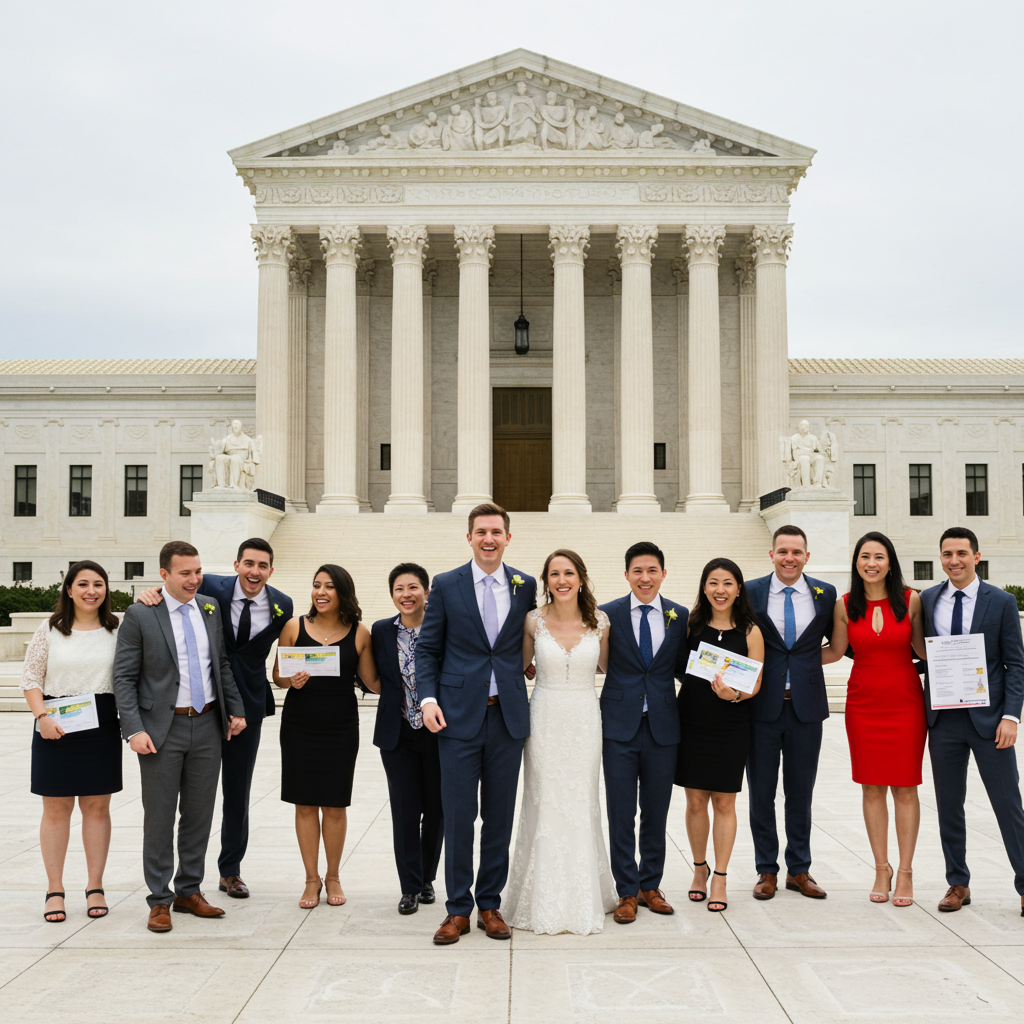The U.S. Supreme Court has decisively rejected an appeal seeking to overturn the landmark Obergefell v. Hodges ruling, which legalized same-sex marriage nationwide. This significant decision leaves protections for married same-sex couples firmly intact across the United States. The Court’s denial of the appeal underscores the enduring legal status of marriage equality, offering clarity and stability for millions of Americans.
This rejection came without explanation or noted dissents, a common practice for the Supreme Court when declining to hear a case. The appeal originated from Kim Davis, a former county clerk from Kentucky. Her challenge reignited debates around religious freedom and LGBTQ+ rights, especially in the wake of other recent high-profile judicial decisions. For advocates of marriage equality, the Court’s action signals a strong commitment to established precedent.
The Foundation of Marriage Equality: Obergefell v. Hodges
In 2015, the Supreme Court delivered a monumental decision in Obergefell v. Hodges. This ruling declared that the right to marry is guaranteed to same-sex couples by both the Due Process Clause and the Equal Protection Clause of the Fourteenth Amendment to the United States Constitution. This historic judgment fundamentally reshaped the legal landscape for LGBTQ+ individuals, extending the full rights and responsibilities of marriage to all citizens regardless of sexual orientation.
The Obergefell decision stemmed from lawsuits filed by same-sex couples challenging marriage bans in their states. The plaintiffs argued that these bans violated their constitutional rights. Justice Anthony Kennedy, writing for the 5-4 majority, stated that marriage is a fundamental right, and denying it to same-sex couples imposed a grave and continuing harm. This established a constitutional right to marriage equality that has been a cornerstone of LGBTQ+ rights ever since.
Kim Davis’s Challenge and the Fight for Religious Accommodation
The recent appeal was spearheaded by Kim Davis, who served as the Rowan County Clerk in Kentucky. In 2015, following the Obergefell ruling, Davis garnered national attention for her refusal to issue marriage licenses to same-sex couples. She cited her deeply held religious beliefs as the basis for her actions. This stance put her in direct conflict with federal law and the Supreme Court’s ruling.
Davis argued that issuing licenses to same-sex couples would violate her First Amendment rights, specifically her right to freedom of religion. A federal judge subsequently held her in contempt of court for her refusal. She was briefly jailed and later ordered to pay significant damages and legal fees to the same-sex couples she had denied. Her lawyers continued her legal battle, framing her case as a critical test of religious freedom. They contended that Davis deserved “accommodation for her religious beliefs.”
The Core of Davis’s Appeal
Davis’s legal team did not merely seek an exemption for her religious beliefs. Their appeal to the Supreme Court went further. They explicitly requested that the Court revisit and potentially overturn the entire Obergefell decision. Her lawyers urged a “course correction” on the 2015 ruling. They argued that her situation, being the “first individual who was thrown in jail post-Obergefell,” highlighted the need for judicial review.
The legal arguments focused on the tension between religious freedom and equal protection. Davis’s attorneys aimed to leverage the Court’s conservative majority. They cited language from a 2022 concurring opinion by Justice Clarence Thomas. In that opinion, Justice Thomas had urged the Court to “reconsider” constitutional protections for gay marriage and other rights following the overturning of Roe v. Wade.
Why the Supreme Court Rejected the Appeal
The Supreme Court’s decision to reject Davis’s appeal, while a major news item, was largely anticipated by legal experts. Cases typically require the votes of at least four justices to be added to the Court’s docket, a threshold known as “granting certiorari.” Despite the conservative leaning of the current Court, achieving those four votes for an Obergefell challenge proved difficult.
Several factors likely contributed to the rejection. First, the principle of stare decisis, which favors upholding established legal precedents, plays a significant role in judicial decision-making. Overturning a widely accepted and implemented precedent like Obergefell would represent a major disruption. Second, the Court often prefers cases that present a clear conflict among lower courts or novel legal questions. Davis’s appeal, while rooted in religious freedom, ultimately sought a wholesale re-evaluation of Obergefell itself.
Navigating Post-Roe Speculation
The speculation surrounding Davis’s appeal intensified after the Court’s 2022 decision in Dobbs v. Jackson Women’s Health Organization, which overturned Roe v. Wade. That ruling eliminated the constitutional right to abortion, sending shockwaves through the legal community. Justice Thomas’s concurring opinion in Dobbs explicitly called for reconsidering Obergefell, along with other rulings based on substantive due process. This fueled concerns among LGBTQ+ rights advocates about the stability of marriage equality.
However, many legal analysts pointed out the differences between Roe and Obergefell. Roe had been a deeply divisive precedent for decades, facing consistent challenges. Obergefell, while contentious at the time, has been widely implemented and accepted. The Court’s denial of Davis’s appeal indicates a reluctance to revisit such a fundamental right without compelling new legal arguments or a broader consensus among the justices. Three justices who dissented in Obergefell — Justice Clarence Thomas, Justice Samuel Alito, and Chief Justice John Roberts — remain on the Court, but they alone are not enough to bring a case to the docket.
Enduring Implications for Marriage Equality
The Supreme Court’s rejection of the appeal sends a clear message: the right to same-sex marriage, established nearly a decade ago, remains settled law. For LGBTQ+ couples nationwide, this decision provides significant reassurance about the stability and longevity of their constitutional rights. It reinforces the idea that marriage equality is a fundamental aspect of American law.
While the ruling safeguards marriage rights, the broader tension between religious freedom and anti-discrimination laws continues to be a subject of legal and political debate. Cases involving religious objections to providing services for same-sex weddings, for instance, still arise in lower courts. However, the Court’s latest action firmly upholds the foundational right to marry for all individuals. This protects existing marriages and ensures that future generations can plan their lives with this fundamental right secure.
Frequently Asked Questions
What was the Supreme Court’s recent decision regarding same-sex marriage?
The Supreme Court recently rejected an appeal that aimed to overturn the 2015 Obergefell v. Hodges decision, which legalized same-sex marriage nationwide. This action means the existing constitutional protections for same-sex couples’ right to marry remain fully in effect. The Court did not provide a specific explanation for its denial, nor were there any noted dissents from the justices.
Who is Kim Davis, and what role did she play in challenging marriage equality?
Kim Davis is a former county clerk from Rowan County, Kentucky. In 2015, she gained national attention for refusing to issue marriage licenses to same-sex couples, citing her religious beliefs. She was held in contempt of court and briefly jailed for her defiance of the Obergefell ruling. Her appeal to the Supreme Court sought to overturn Obergefell v. Hodges, arguing for religious accommodations and a “course correction” on the same-sex marriage decision.
Does the Supreme Court’s ruling guarantee the future of same-sex marriage rights nationwide?
The Supreme Court’s rejection of Kim Davis’s appeal strongly reinforces the stability of same-sex marriage rights nationwide. By declining to revisit Obergefell v. Hodges, the Court signals its continued adherence to this landmark precedent. While future legal challenges can always arise, this decision indicates a reluctance by the current Court to disturb established marriage equality. It provides significant reassurance for LGBTQ+ individuals and couples across the United States.




